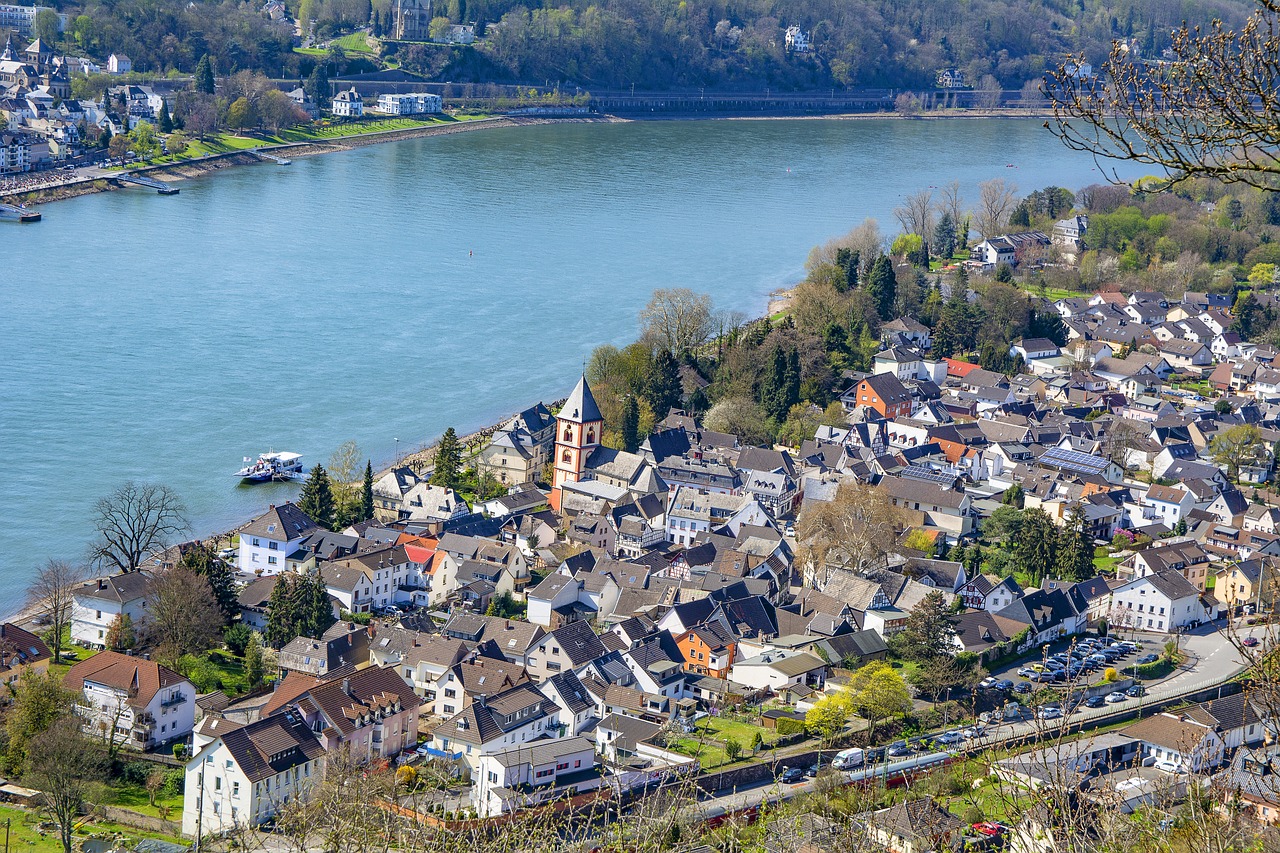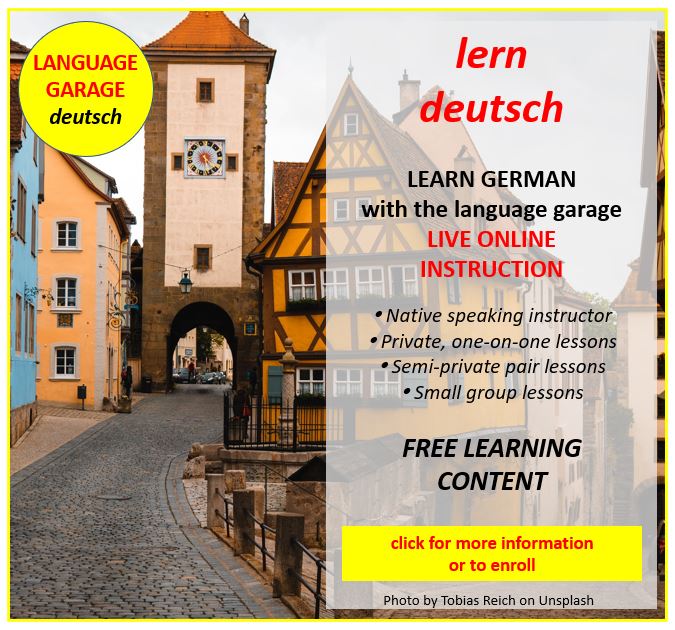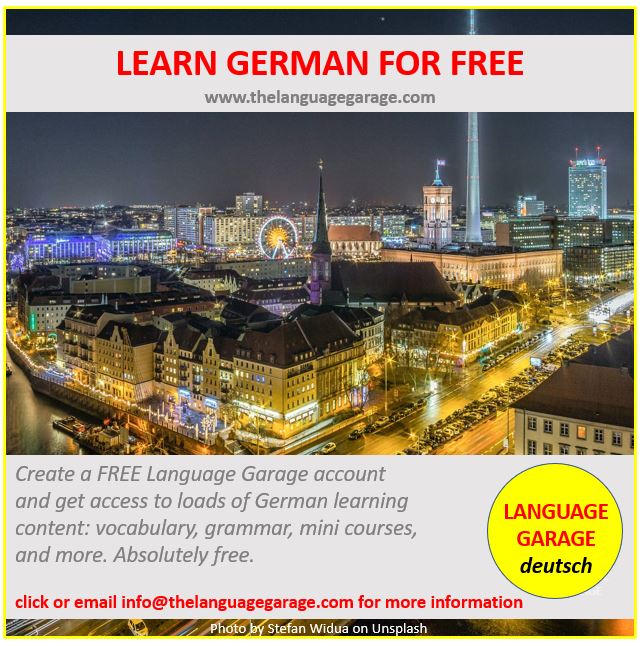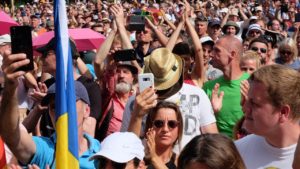Die Stadt: German Vocabulary for Towns and Cities
In this post you’ll learn German vocabulary for towns and cities. First you’ll learn key vocabulary for things you see around town. Next you’ll learn German vocabulary for stores. After that you’ll see vocabulary for schools, restaurants, and other buildings you’re likely to see around town. Finally you’ll learn how to ask directions in German. All of this vocabulary will help you navigate everyday life in German.
German Vocabulary for Around Town
Let’s start with some basic general vocabulary: das Gebäude, -Ø building; das Wohngebäude, -Ø apartment building; das Bürogebäude, -Ø office building; die Straße, -n street; die Autobahn, -en highway; der Bürgersteig, -e sidewalk; der Park, -s park; der Parkplatz, -¨e parking lot; der Parkplatz, -¨e parking space; das Hotel, -s hotel.
- Wo ist das Hotel?
Where’s the hotel? - Es gibt einen Park in der Nähe.
There’s a park near here. - Wie viele Wohnungen gibt es in diesem Gebäude?
How many apartments are in this building?
German Vocabulary for Stores
Now let’s look at how to say various kinds of stores: der Laden, -¨Ø/das Geschäft, -e store; der Supermarkt, -¨e supermarket; das Kleidungsgeschäft, -e clothing store; das Schuhgeschäft, -e shoe store; der Juwelierladen, -¨Ø jewelry store; die Bäckerei, -en bakery; die Konditorei, -en pastry shop; die Metzgerei, -en/die Schlachterei, -en butcher; die Eisenwarenhandlung, -en hardware store; der Buchladen, -¨Ø bookstore; das Elektrogeschäft, -e electronics store; die Apotheke, -n pharmacy.
- Auf dieser Straße gibt es viele Geschäfte.
There are a lot of stores on this street. - In meinem Ort gibt es einen großen Supermarkt.
There is a big supermarket in my town. - Gibt es hier in der Nähe ein Schuhgeschäft / ein Bekleidungsgeschäft / einen Buchladen?
Is there a shoe store/ clothing store/ bookstore nearby?
German Vocabulary for Places around Town
Now let’s look at vocabulary for other places around town: die Schule, -n school; die Bücherei, -en/die Bibliothek, -en library; die Universität, -en university; die Feuerwache, -n firehouse; die Post post office; das Polizeirevier, -e police station; das Krankenhaus, -¨er hospital; die Tankstelle, -n gas station; die Kirche, -n church; die Synagoge, -n synagogue; der Tempel, -Ø temple; die Moschee, -n mosque.
- Die Schüler sind in der Schule.
The students are at school. - In meiner Stadt gibt es eine Universität.
There’s a university in my city. - Ich gehe zur Post.
I’m going to the post office. - Ich gehe zur Bücherei.
I’m going to the library.
German Vocabulary for Entertainment
Now let’s look at vocabulary related to fun and entertainment: das Restaurant, -s restaurant; die Bar, -s bar das Museum, Museen museum; das Kino, -s cinema/movie theater; das Theater, -Ø theater; die Kunstgalerie, -n art gallery.
- Gibt es ein gutes Restaurant?
Is there a good restaurant? - Lass uns ins Kino gehen.
Let’s go to the movies. - Wir möchten eine Kunstgalerie besuchen.
We would like to visit an art gallery.
German Vocabulary for Transportation
Now let’s look at some vocabulary related to getting around town: der Bahnhof, -¨e train station; der Busbahnhof, -¨e bus station; die Bushaltestelle, -n bus stop; der Flughafen, -¨Ø airport; die U-Bahnhaltestelle, -n subway station.
- Der Bahnhof ist im Zentrum / in der Innenstadt.
The train station is downtown. - Ich fahre mit dem Zug in die Stadt.
I take the train to the city. - Ich fahre mit dem Bus zum Flughafen.
I take the bus to the airport.
How to Ask Directions in German
Let’s end with a few expressions related to asking directions: hier here; dort there, rechts to the right; links to the left; in der Nähe nearby; weit far away.
- Wo ist die U-Bahn?
Where is the subway? - Das ist hier.
It’s here. - Das ist dort.
It’s there. - Das ist rechts.
It’s to the right. - Das ist links.
It’s to the left. - Das ist ganz in der Nähe.
It’s nearby. - Das ist sehr weit.
It’s far away. - Das ist neben dem Hotel.
It’s next to the hotel. - Das ist gegenüber/auf der anderen Straßenseite.
It’s across the street. - Gehen/Fahren Sie geradeaus.
Go straight. - Gehen Sie nach links./Biegen Sie links ab.
Turn left. - Gehen Sie nach rechts./Biegen Sie rechts ab.
Turn right.
Learn German with the Language Garage!
We hope you’ve enjoyed learning some German vocabulary for towns and cities. Now you know how to use German vocabulary for stores, how to ask directions in German, and how to talk about places you’re likely to see in everyday life. If you’re interested in learning more, check out our other posts on German language, culture, and more. And if you’re looking for convenient and affordable live German lessons with a real teacher, check out The Language Garage German. Our lessons are given online in a virtual classroom, so it doesn’t matter where you live or work. We can come to you. And we have flexible options, with a free trial so that you can decide if there’s a fit. Check us out!
Image by Valdas Miskinis from Pixabay






